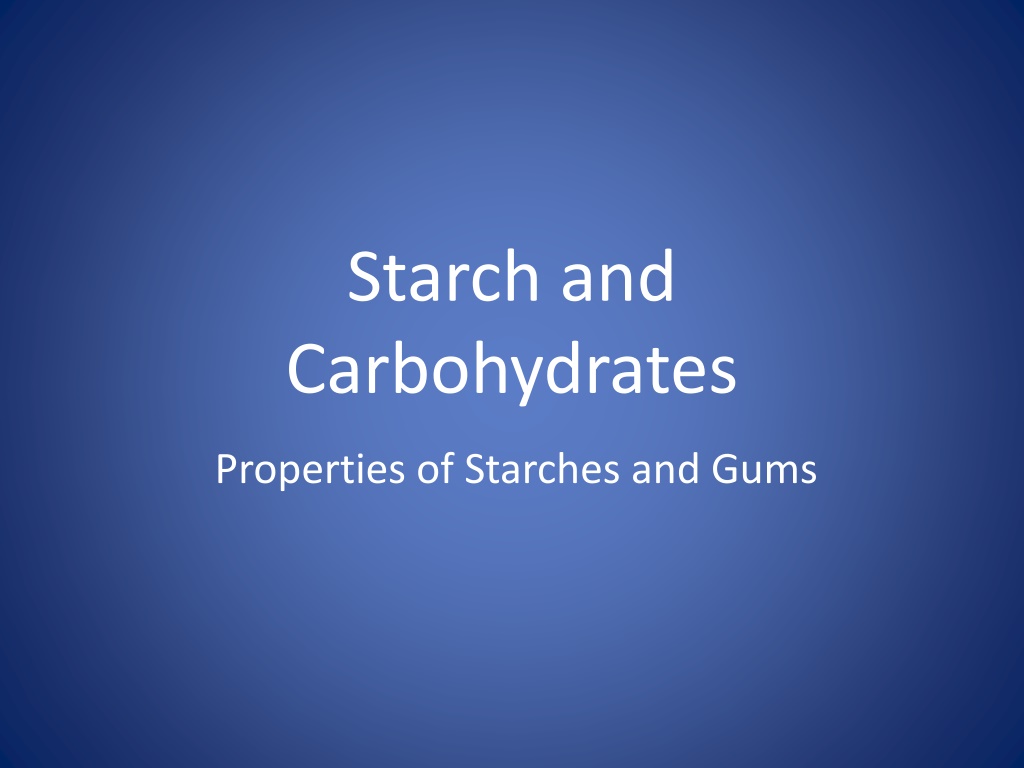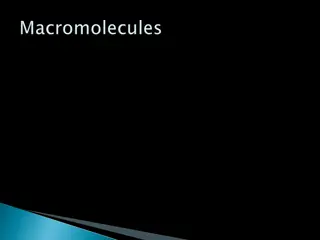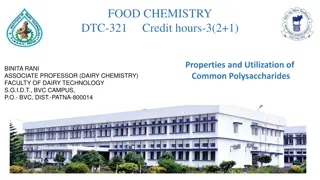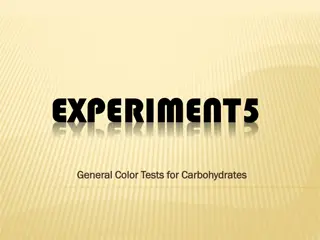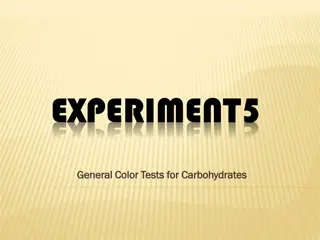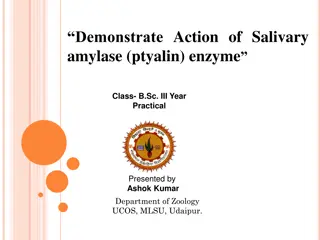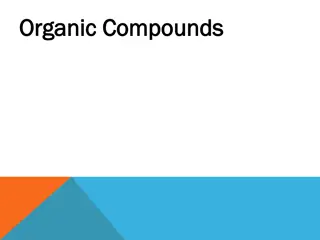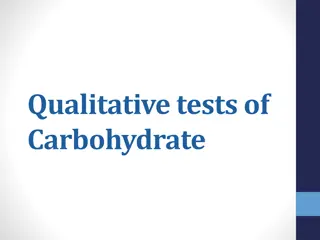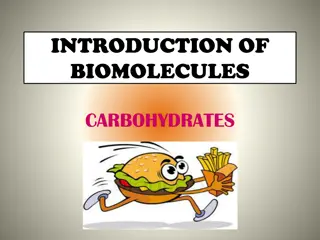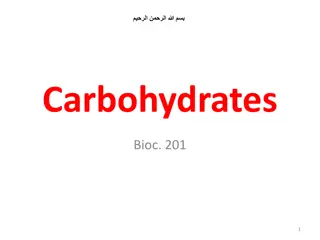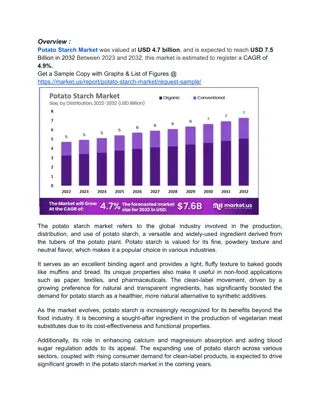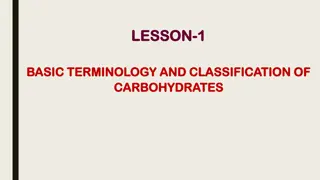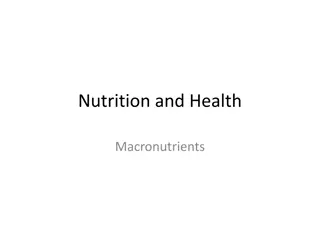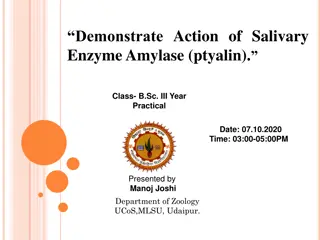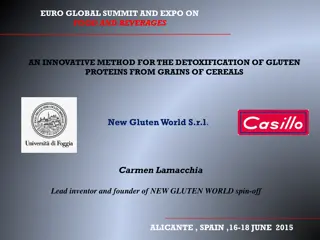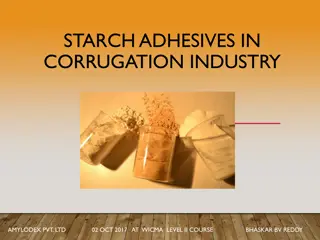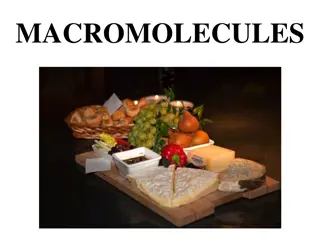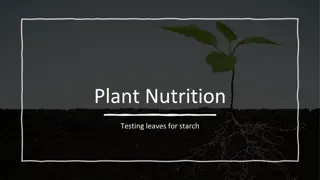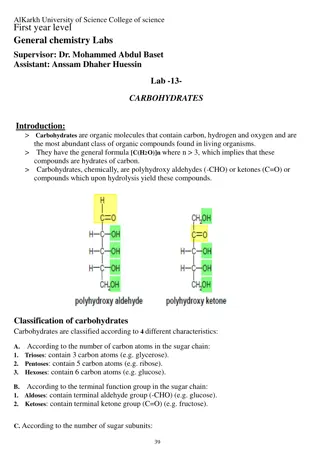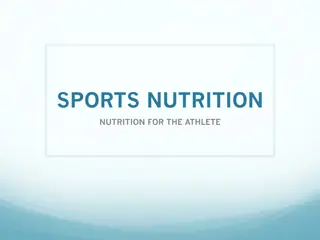Understanding Starch and Carbohydrates in Food Science
Explore the properties of starch and gums, the characteristics of starches like amylose and amylopectin, important processes such as gelatinization and retrodegradation, factors affecting starch gelatinization, and a lab experiment to investigate the factors impacting the thickness of cooked starch paste using various starch types.
Download Presentation

Please find below an Image/Link to download the presentation.
The content on the website is provided AS IS for your information and personal use only. It may not be sold, licensed, or shared on other websites without obtaining consent from the author. Download presentation by click this link. If you encounter any issues during the download, it is possible that the publisher has removed the file from their server.
E N D
Presentation Transcript
Starch and Carbohydrates Properties of Starches and Gums
INTRODUCTION Energy storage for plants and animals Food Industry: Thickening or gelling agents: Expand or make food systems smaller Give opacity or transparency Retain moisture or repel it Help emulsions
Characteristics of Starches Amylose Amylopectin
Characteristics of Starches Amylose water to enter and swell the starch granule in the crystalline region Found in Amorphous region Upon Heating - leached out allowing Amylopectin Found in Crystalline region Highly influences on viscosity changes due to water and heating (gelatinization)
Important Processes Gelatinization Swelling of starch granules due to water and heat Gelatinization temperature: the temp at which Max. viscosity is reached. Retrodegradation At cooling, re-association of hydrogen bonds between the molecules of amylose that are leached out. Increase in amylose content in starch leads to Increased in viscosity
Factors Effecting Starch Gelatinization Starch Composition (Ratio of Amylose to Amylopectin) Botanical Source (i.e. Potato vs Corn) pH Rate of Shear Modifications (Chemical and Physical)
Objective To investigate the factors that affects the thickness of a cooked starch paste and to compare the usefulness of various starches (i.e. normal, waxy, and modified).
Lab 1st Part: Gelatinization and Retrodegradation properties of starches Select up to 3 Starches (0.25 to 0.5 grams each) Add water: about 80% of test tube SLOWLY Begin heating the water: OBSERVE Shake as temperature increases: don t be shy!!!! Record your observations!!! (as temperature changes) Solubility, color, texture Record GTR: temperature range at which starch starts swelling until the last bit has gelatinized. Cool starches and observe changes in viscosity or gel strength Record your observations!!!
Lab 2nd Part: Modification of Starch Gelatinization Select your Starch and place into separate beakers (1 g) Add your respective modification Mix all at once: Mix it good!!!! Bring to a constant volume (~50 mL) with water Place them on the heat plate and slowly heat until gelatinization temp is reached. Record your observations!!! Solubility, color, texture Don t overheat starch!!! Take your time in heating Stir Add more water as needed, keep constant Record your observations!!!
Lab 2nd Part: Cool the samples as best you can (cold water / fridge) Pour a uniform amount in a beaker and cool in cold water Determine viscosity LINE SPREAD TEST LINE SPREAD TEST: Fill sample cup to top, leveling it off. Dump onto the line-spread circles over the plastic lid. Allow to spread for 2 minutes. Read nearest line on all four sides.
Lab Results Which starches would be suitable for thickening a sauce or gravy? For a cherry pie? For a cream pie? A soup? Etc. Explain your answers. Why is the GTR and the time it takes to gelatinize an important factor? Explain. What effect does the addition of sugar, oil, and acid have on the gelatinization of starch? Why is this important for the food industry? Explain.
Organization of lab Starch Modifications (Wheat): Lab Group # Modifications 1 Sucrose = 0, 5 and 10 grams 2 Oil = 0, 2 and 5 mL 3 Citric Acid = 0, 3 and 6 grams 4 Sucrose + Citric Acid = 0+0, 5+3 and 10+3 grams 5 Oil + Citric Acid = 0+0, 2+2 and 5+2 grams What else can you do? What would you like to try?
Discussion Which starches would be suitable for thickening a white sauce or gravy? For a cherry pie? For a cream pie? Etc. Explain your answers. Why is the GTR and the time it takes to gelatinize an important factor? Explain. What effect does the addition of sugar, oil, and acid have on the gelatinization of starch? Why is this important for the food industry? Explain.
